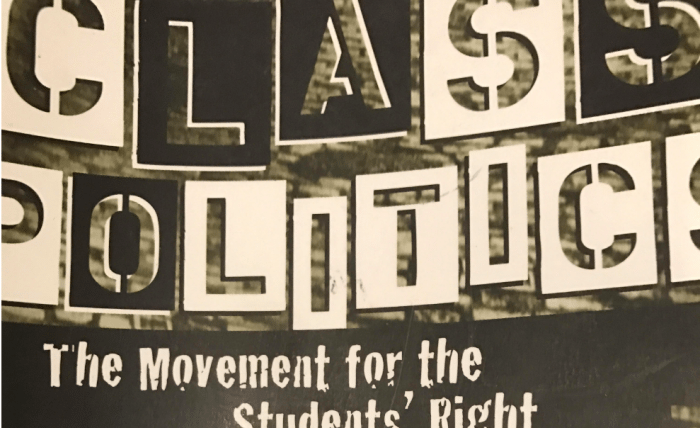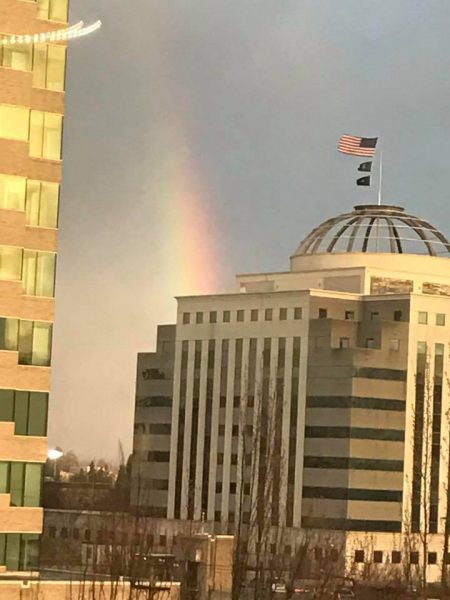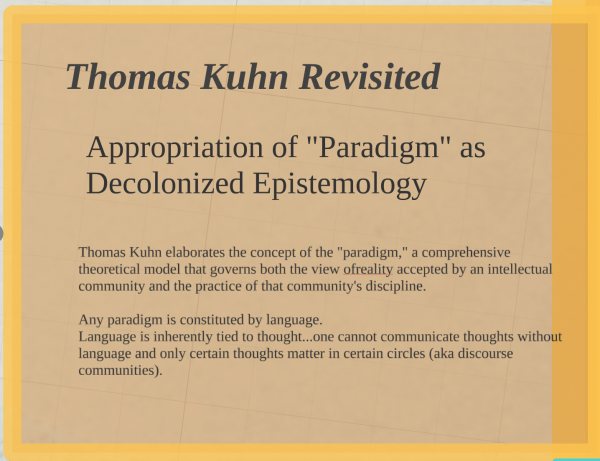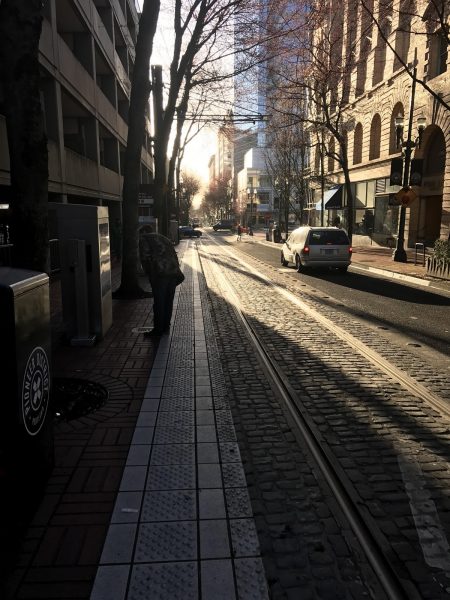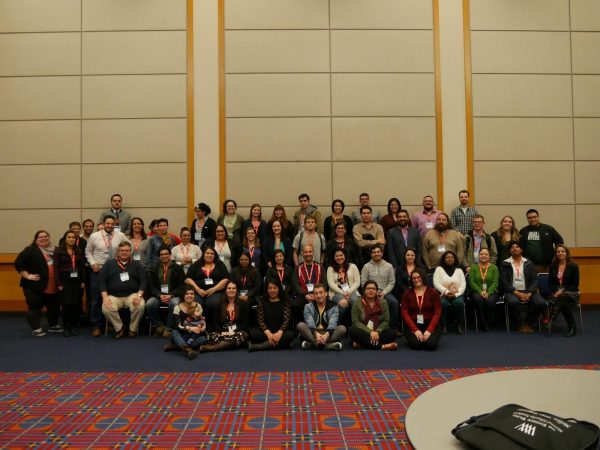Historical Exigence
The story begins here on March 15, 2017 at the College Conference on Composition and Communication (4 C’s), a field/discipline that has been largely been built upon politics surrounding “inclusive” approaches to teaching writing and rhetoric to a racially and linguistically diverse student body who demanded increased freedom and opportunity and less prejudice and discrimination in higher education. As Stephen Parks; book, Class Politics: The Movement for the Student’s Right to Their Own Language (SRTOL), states:
…perhaps more than any other discipline, composition studies owes its current status to the counterhegemonic struggles waged around access to higher education. Without the efforts of the New Left, the Great Society, or Black Power, the reconceptualization of nontraditional students in the academy during the 1960’s might not have occurred. Mina Shaughnessy’s Errors and Expectations (1977) would not have had an existing market to formulate. David Bartholomae’s “The Study of Error” (1980) would not have had the same bureaucratic or institutional framework for which to be read.
The Setting
The Lyft drivers had a range of stories to tell about Portland, Oregon.
First Day: Lisa tells of the gentrification and displacement running rampant while the population of the city is growing about 20,000 per year. She tells of the demographics in the area: 20 percent Latinx, 15 percent Black, 11 percent Asian and the rest is pretty much White.
Another tells of the scandal of the governor of Oregon for the past 15 years or so, who was using his girlfriend to make business contracts directly associated with her husband’s ability to profit from them. She says she is a White Ally.
Second Day: John is quiet when I say that the policy to remove rent caps in Portland as a social safety net for Portland residents in want of revenue in the housing market sounds a lot like the social safety nets that are being rolled back by the minute by the current Trump administration. He is quiet when I say I wouldn’t judge him if he voted for Trump. I mean very quiet… not a peep. Sometimes silence speaks louder than words. He voted for Trump and regrets it.
Third Day: Silence speaks louder than words… Dana tells me of her reason for the down face when I entered her car. I read her emotions before getting in. She said she had worked for 12 hours the day before, and her daughter kept her up even later. She was ready for the weekend because everyone needs a break. She is not just tired; she is exhausted. She needed to vent. Her face and sigh said all I needed to hear for that 10 minute ride.
Last Day: Brock, a Ukrainian driver, tells me that one has to be smart in order to survive in my country. He’s still working on citizenship he tells me. I get quiet. Sometimes silence speaks louder than words. He lives in fear.
For some reason, all of these drivers remind me of Barbara Erenreich. They all seem to be struggling to survive and make ends meet in an increasingly hostile society that is veering toward survival of the fittest more and more…
A Decolonial Meditation
I am a historian. I tell stories. I’ve written an “inclusive” critical history of Composition Studies, which considers the critical alternative sites of the Normal School tradition in the Midwest and at Chicanx Literary History in the Southwest. This focus was an effort to reclaim a more critical history of the field. So, I compared the 1870’s Reconstruction Era to what happened to C’s in 1968 because both moments have claimed to be results of the need for greater “inclusion.”
Interestingly, this word possesses as many meanings as the various moments in history which worked to be more inclusive. My meditation, then, is a brief decolonial consideration of this word: “inclusion.” The word “inclusivity.” I feel qualified to problematize this word as I also consider myself a decolonial etymologist, as is demonstrated in my edited collection, coedited with Raúl Sánchez, Latinx Keywords.
As a historian and decolonial etymologist, I now have two books that contain my ethos quite legitimately in the Western realm of legitimacy. I’ve been in the field since 2000, so while I might be excused for not citing extensively here. I will cite those who seem to provide legitimacy to my claims and perspectives about inclusion provided here. So, with the word “inclusivity” in mind, I want to turn back briefly to a moment in the history of C’s that historians of the field should at least have a passing familiarity with because it is a key historical moment that sparked a huge watershed of scholarship specifically dealing with racial and linguistic “inclusiveness,” as Stephen Parks also alludes to above. In this context, one thinks of the need for SRTOL and the field’s various aims to be “inclusive.” In addition to what Parks points to above, one also thinks about CUNY, Open Admissions and the work of Mina Shaughnessy associated with the move toward a more just and inclusive profession.
Back then, “inclusivity” was a call to pay greater attention to certain racial minorities, mostly Black students at this time but also to Black Composition scholars because of their histories in common with Martin Luther King, Jr. The African American vernacular, for example, was the focus of SRTOL, as the word “dialect” is used throughout the piece and not “language”. Of course, there were other racial minorities accommodated at this time, as this was also the impetus for the creation of Chicanx Studies and Mexican American Literature. With these moments, came the rise of feminist compositionists and rhetors, disability rhetorics, the process movement and Peter Elbow. All these moves in the field came at a crucial point when people of color were demanding greater visibility and legitimacy in what seemed to be a not-so-democratic society for them up until this point. Democracy was to be had for all, not just a select few, and this would be why the push to be more racially “inclusive” was what was meant as “inclusive” at this time. In short, Composition Studies experienced a paradigm shift (Hairston) that was inextricably tied to the Civil Rights Movement and challenges to claims of linguistic and racial exclusiveness. It is because of this paradigm shift that I can now situate myself within the field as it allows me to enter myself into this current meditation as a Latinx with in Indigena/decolonial consciousness, one with a psyche that resembles a bordertown because I encompass many of the subject positions mentioned in Gloria Anzaldúa’s quote:
The struggle is inner: Chicano, indio, American Indian, mojado, mexicano, immigrant Latino, Anglo in power, working class Anglo, Black, Asian–our psyches resemble the bordertowns and are populated by the same people. The struggle has always been inner, and is played out in outer terrains. Awareness of our situation must come before inner changes, which in turn come before changes in society. Nothing happens in the “real” world unless it first happens in the images in our heads.
Like Anzaldúa, I am a Chicana/Indigena/India/Mexicana/Latinx. I am a decolonized, Third World feminist. I possess a border consciousness that is rough. To be so, is to navigate a rough terrain of identities and to be comfortable viewing the mental bordertown as a rough-edged mental schism that forces me to jaggedly slide back and forth through identities, experiences, traumas, languages, and histories while hitting bricks and pikes between transitions; but I have faith in Anzaldúa’s words. I believe that if I can imagine it, I can become it, and if I vocalize it, I can make it materialize and manifest as discursive possibilities in the here and now. So back to my meditation…
I think back to this history of the profession and of all of these experiences that the Lyft drivers acquainted me with about this space and land: Portland, Oregon… a place that I’ve only associated with beauty and peace. I get acquainted with the town and its gentrified culture of vegan foods, rainy sidewalks, metro tracks, brick streets, homeless corner dwellers and cannabis dispensaries. On almost every corner, you see a place that claims wellness, offers pilates and promises yoga zen. A place where meditation and mindfulness are the norm and the seductiveness of the oh-so-good-eateries everywhere is enough to entice anyone. It is a place that rarely gets sunshine, but the seduction of the newness, the fresh rain, and the fresh food are more than enough of a compensation. I feel I’ve gotten a good enough acquaintance with the town: it’s a cool place.
But then I remember why I’m there: the 4C’s conference.
This time I’ve brought two colleagues with me. This time, I’m not running the workshop, this time C’s will be more “inclusive,” this time, I will feel welcome because I have this hope that this time people have gotten it and that this time, in 2017, people will realize that this culture of division and exclusion just can’t continue to go on.
However, this time I was wrong, again, and I think back to what it must have been like to be Erenese B. Kelly. What she must have felt like to be the one that had to muster up enough strength to have written to her colleagues just after MLK Jr.’s assassination.
What it must have been like to have lost such a great soul and to have to write to her colleagues of the death of the American Dream. You would think that her colleagues would have gotten it then, that they would have realized, and that they would have all fought to rescue the dream and to resuscitate those that died inside when MLK Jr. died. You would think that all the pleading she witnessed King express in his “Letter” would have been now attended to and that while he was no longer alive to “wait” for justice to be served that justice would NOW be served. You would think that the ways in which MLK Jr. pleaded for “inclusion” would have now been understood by everyone and you would most certain think that the white feminists who had long fought for “inclusion” would realize that their notions of “inclusion” would be altered and immediately become intersectional for good. You would think all of this as I thought, then I entered into the conference doors. This word “inclusivity” and variations of it are all around the conference program, but don’t materialize anywhere. Could Anzaldúa be wrong? It must first happen in your mind before it can manifest reality?
“Inclusive”… how is it that some seem to have such a limited notion of the word?
Some Examples
Although it has been personally noted that the claim to want to depoliticize C’s has been stated more than once over the past two years (a practice that is impossible) most of the panel titles if not all are inherently political. As a matter of fact, I and many others strongly affirm that it is absolutely the business of our profession to be political and to address the dilemmas that our current student bodies are facing. We teach writing. Writing is a political act. Tt is the way a polis expresses their being and makes their mark on the world. Further, the variety of that polis must always be fairly accounted for in such a profession that teaches a nation of immigrants from all walks of life.
Education is political. There is no getting around that. However, when we can all agree on that, then we can get into more useful discussions about the politics of “inclusive” pedagogy, publication, hiring practices and inclusive practices that would indeed manifest in a greater, more inclusive profession. So, attempt to be “inclusive” by putting my critiques in dialogue with my experiences with the Latinx Caucus who, this year, has brought its own version of “inclusivity” by bringing in local activists from the Portland area who are tirelessly working as writers, painters, musicians and activists to their ensure cultural survival in the area.
My claim, starkly stated, for this review is that middle class white people in our profession are still contributing to scholastic imperialism while at the same time claiming to be more “inclusive.”
People of color are have now replaced the sad woman in the basement.


This is a photo of the outside view of the venue I presented in, along with my colleagues on Friday at 8:00 am.
It is no secret that the majority of articles that get published in mainstream composition journals are written by white scholars. White scholars define the terms of our profession, the conventions, the topics to be considered, as well as who gets to be in the profession. Furthermore, white people perpetuate the manners in which the field is currently exclusionary of people of color. While Asao’s book won the book award, assessment processes of “inclusive” pedagogies still govern the legitimacy of writing programs and their laborers. WPA’s, for example, possess a great deal of power and are still at loss for how to make their program more socially just and fair while refusing to engage with and publish the critical work of “inclusion” being written by People of Color. Further, WPA’s are currently exhibiting desperation in trying to train their faculty to teach an increasingly diverse student population, but then also are seeking to appropriate the knowledge of scholars of color to publish and practice for their own gain. I witnessed this happening on several levels:
The question comes up, “How does one measure the success of your critical historical pedagogy?” I gaze back at my white, male interviewer. This is decolonial practice, and I am a decolonized Latinx. Who is schooling who here?
“How can she measure the success of your pedagogy? How would she know it works?” He has to phrase this question three times and this was my answer:
“I’m not sure I know what you mean.”
“I know, I’m not sure I know either.”
“One more time.”
“Uh.”
“I know.”
“Look, let me answer your question this way, because I think I know what you’re getting at. You want to know about how my pedagogy would be assessed.”
“Uh…well how would she say it works or not?”
“Exactly.”
“So, I’ll answer that for you. California recently passed AB 2016, a law that calls for the implementation of Ethnic Studies statewide. For the first time in history, it will be required for all high schools to have Ethnic Studies elective offerings. This is unprecedented in California. It has been proven that Ethnic Studies has a direct correlation with more positive student outcomes.”
“Oh.”
“Yeah.”
Decolonizing “Inclusion” through a Reciprocal Gaze
The panelists of “Editing for Inclusion and Change” called themselves “gatekeepers.”
The ownership of this term is noteworthy at first. It said that they acknowledged their power. What happens next was a direct display of the power they have while admitting that Karma often comes with rejecting over 200 submissions a year for one given journal. Still the title includes the word I am questioning here. While claiming to want to be more inclusive, it really sounded to me, a Latinx very much aware of the scholastic imperialism that has characterized our field since its genesis, like more of the same.
As I watched from an audience of about 50 (four of which were POC), I watch the presenters sit up there like the gatekeepers they claimed to be. I witnessed their use of sliding rhetorics to promote the notion of inclusion in journals and books. One particular panelist called for multimodal multilingual manuscript submissions and even multigeneric texts. However, I wondered how this would be the case when the demographic they clearly stated was feminist scholarship that would exhibit the inclusion they claimed to desire. I watched them sit there and claim inclusion while not once mentioning the word “race.” I listened to one speaker admit they take quotas for certain demographics while ignoring other. I also noticed that their definition of inclusion referred to the topics that they publish but not the people they publish. This was their version of inclusivity. How would this definition accommodate multilingual and multigeneric texts? This phenomenon is what one refers to as “sliding rhetorics” of exclusion. I could only watch this panel without saying a word because I had experienced such a welcoming Latinx Caucus Workshop the day before where our decolonized psyches were filled with love for ourselves and others who we see as reflections of ourselves.
I now turn my decolonized gaze toward the Latinx Caucus workshop where we welcomed a local muralist, a local creative writer, and local activist.
Chicanx musicians also performed. The energy, the vivacity, the call for cultural preservation at the very moment in which our cultures are being ignored and silenced everywhere else was magic.
Ana Ribero talked about picking up undocumented people released temporarily from detention centers and dropped off at bus station to help them get to their families. She expressed the exhaustion she felt while feeling compelled to do this work. She dedicated herself to a cause much bigger than herself, but couldn’t sleep at night otherwise. She was inspiring,
Was this workshop inclusive? It was open to everyone, and we never talked about who we would include or exclude. Our mission is to contribute to the larger conference while calling attention to ourselves from that same conference and its participants. We love CCCC, and we want it to love us back. Decolonized love can only be reciprocal love.
The roundtable, also sponsored by the Latinx Caucus, became a meditative space instantly as a very special “death” quilt was displayed by Sonia Arellano. The quilt is a “semiotic text” from a colonized perspective. From a decolonized perspective, the quilt embodies and represents the threat of the border, the death that it causes, the plasticity of the border, and the fatal denigration of the lives it decomposes. The border splits us, and splits us unnaturally so. Where were those claiming to be inclusive? Claiming to want our projects?
After the roundtable, Alex asked me to touch the quilt, and I did. I can’t express the amount of chills that hit my warm body when I touched that part of the quilt that was made by a little body’s jeans. I was overtaken with a creepy energy by every piece of that quilt I placed my hand upon. I thought about how every piece belonged to a dead, distant relative of mine. It was unfathomable that the reason for their death was the crime of walking across sand or dirt. I had nothing but respect for Sonia’s work and the real material she brought to the conference.
All presenters of the roundtable dealt with decolonial topics and reclaimed the space of the conference through an indigenous lens. If you missed the roundtable, you missed a talk on the history of the image of “the sleeping man,” the traveling tamales and the semiotics of food, the snake and dream theory associated with Meso-American history and culture. Part of this culture is reclaiming our indigenous past which includes the folk ways of our ancestors and the Meso-American practices associated with healing, being one with the universe, and being ultimately tied to the planetary movements, natural ecologies and metaphysical aspects of the unseen. Walking the Red Road. Red Medicine was mentioned twice.
I now turn my decolonial gaze upon an interesting panel titled:
Composing Medical Humanities
My expectations of this panel did not prepare me at all for what I would encounter. I thought I would learn of more scientific subjects, perhaps something like the ways that medical research studies were presented with the most cutting edge medical practices. I still think part of this subfield encompasses that; however, I also think that had this panel been more inclusive, it would have acknowledged the origins of some of the practices that this panel promoted as “medicine” such as mindfulness and meditation in the classroom.
I totally got that were in the wellness city of Portland, but I thought we were more in touch with our histories and had gained a greater awareness of the ways that Native American cultural practices had been appropriated. I acknowledge that the speaker quoted (Thich Nhat Hanh) which anyone who is familiar with the “new mindfulness movement” would be tasked to quote, but if she really wanted to be inclusive, there would have also been the acknowledgment that these types of practices, once thought to be pagan were the very types of practices that colonists sought to eradicate and erase from historical memory. The fact that they are not trendy acts, for some of us comes off as a direct disrespect for the healing practices of our ancestors that was most certainly their version of human medicine.
For Alejandra Ramirez, I think this presentation would have been quite a nice mirror to reflect her decolonial presentation on the serpent goddess Coatlique and the significance of serpents and the psychoanalytic emerging studies of dream theory. For, according to Ramirez, we act in multiple realms of consciousness at once, and we learn from our dreams to enact that which we want to see on our waking lives. Ramirez, mentions the significance of snakes from a Greek rhetorical tradition as well, and when I asked her about her inclusion of Greek history and epistemology, she said that she learned that everyone is indigenous from somewhere. Now, that is inclusive.
Unsettling the Archives
The printing press was created long before the first composition class. This means that people were composing long before the claimed genesis of composition studies. That’s great, yes, people were printing, and they were trying to be inclusive in that they were writing about what writing meant. Yet, there was still no qualification of the geographical limitations of their study.
Is this inclusive? Why are all histories of Composition located in the East. Of course people were printing before 1870, we know that. Cool that recovering the lost compositions of before Connor and Kithaber claims to the first comp classes starting then. But what about other locales? What does this contribute to our current knowledge about the inclusivity of mainstream composition histories?
This notion of inclusion seems very limited. If we are striving to be genuinely inclusive and we claim to welcome the possibilities of multilingual and multi-generic texts, that welcome invitation needs to be more than symbolic. It has to be materialized in the ways that comp scholars present their scholarship to others.
You cannot welcome what you do not know, and you cannot effectively write about a subject matter such as identity and cultural practices ethically and accurately without including the perspectives of someone who has experienced those you seek to write about. Otherwise, it’s called appropriation. Not appropriation in the sense that you are appropriating the author’s intent in an article, in a chapter, or book (that’s not appropriation, that is scholastic bullying).
Appropriation is claiming someone else’s culture as your own. It is more that just dressing or acting the part. It is a concerted effort to take on the representation of culture without acknowledging the contextual history and experiences of suffering, genocide, colonization, displacement, becoming landless that are inextricably tied to the products these experience materialize. These are not archeological experiences on a display at a museum, these are human experiences. That’s not being inclusive, that’s being obtrusive.
I end this piece as a lamentation that we still have a long way to go before we can claim to be inclusive. That word is not one to be taken lightly. It is much more ethical to say, “White feminists and editing” or “Western Modes of Wellness Rhetoric” and “Elite Histories of Comp Studies and Rhetoric Revisited.” Let’s not claim to be inclusive, when, in fact, we are being elusive. What would MLK Jr. do?
If you’re interested in knowing more about the CCCC Latinx Caucus, please visit our website. All are welcome.
Here is a snapshot of our presence at the Latinx Caucus business meeting this past March:
Stephen Parks has shown a true attempt at being inclusive. If advice is needed, please ask him. By the way, shout out to Emory University for doing their thing to keep the disenfranchised on their campus included in their writing program: now that’s inclusive!
***
For more about Iris D. Ruiz, visit her blog.



